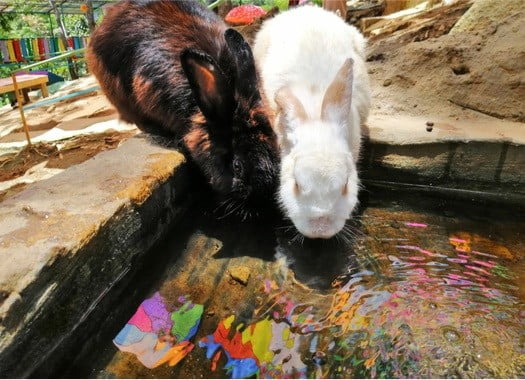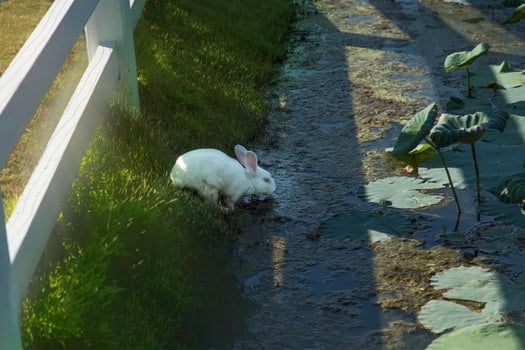Swimming is not something that comes to mind when we think about a rabbit’s favorite things to do. Rabbits, whether wild or domesticated, are widely considered to be ground-dwellers. You’re likelier to find a rabbit digging underground than taking a swim in a body of water.
All rabbits can swim as it’s a basic survival instinct. Most pet rabbits prefer to stay on dry land, but there are exceptions to the rule. Never force your rabbit to go into the water as it can cause extreme shock.
If your rabbit does enjoy swimming, there are health benefits to this activity. It’s great exercise, and can ease aching joints in arthritic rabbits. Just ensure that the watery adventure was your pet’s choice. If she falls into water unexpectedly, she may suffer from shock or have a cardiac arrest.
Can Rabbits Swim?
Rabbits are capable of swimming. This is a survival instinct hardwired into all lagomorphs. Wild rabbits may need to swim to survive. This could arise when fleeing a predator, for example.
Rabbits can usually swim within a week of birth. It may take as long as fifteen days in some breeds. Both front and back limbs are used in a form of doggy paddle.
This behavior is particularly prominent in certain breeds of wild rabbit. Take the Marsh Rabbit as an example. This Florida native will take to the water for safety. Living around swamps and marshes ensures that this becomes second nature.
Even domesticated rabbits have webbed feet. This does not make your pet a natural swimmer, though. A rabbit’s webbed feet are primarily designed to keep the animal safe while jumping.
The will to survive, above all else, drives these small animals. A better question would be whether rabbits enjoy swimming. Just because your pet can swim, it doesn’t mean she should.
Do Rabbits Like to Swim?
In theory, swimming should be a recommended activity for all rabbits.
- Great exercise. Rabbits need 20 minutes of exercise a day. Swimming will tire a rabbit out and give all four limbs a workout. A tired and sleepy rabbit is often a happy pet.
- Doesn’t put pressure on a rabbit’s joints. Unlike hopping, which causes wear and tear, water supports a rabbit’s legs. Aquatherapy can be an excellent treatment for arthritic pets.
- Making use of limited space. Rabbits like to run, hop, and explore. If your yard is small, your pet will soon grow bored. Swimming laps takes more concentration and remains fun for longer.
That is the theory. Unfortunately, theory and practice are two different things.
- Fear. Being suddenly submerged in water sends a rabbit spiraling into panic. This may result in a heart attack. As The House Rabbit Society explains, even a full-body bath can be deadly.
- Breathing. Rabbits need to breathe through the nose. This can be difficult while swimming.
- Contaminants. Water can contain a range of parasites and other dangers. Wild water sources contain bacteria. Swimming pools contain chlorine, which is not ideal for rabbits.
- Rabbits have small lungs. Swallowing substantial amounts of water is dangerous. Even if your pet seems fine, secondary drowning is an ever-present risk.
Above all, many rabbits will avoid getting wet at all coats. There are exceptions to every rule, of course. Some rabbits love to splash, wade, and even swim in the water. Until you’re confident, though, it’s best to err on the side of caution.

Why Do Rabbits Hate Getting Wet?
It’s a universal truth that rabbits loathe getting wet. Your pet spends her life in dry conditions. If her fur gets wet, she cannot retain body heat. Rabbits thrive in cool temperatures, but that’s due to the warmth provided by thick fur.
Imagine wearing a thick, woolen coat outside in a rainstorm. This is how a wet rabbit feels. Your pet cannot take her coat off, either. The cold and damp will seep into her bones. This can put your pet in shock, which is potentially fatal.
Even if your pet dries off and avoids significant stress, wet fur is a pain for rabbits. It tends to become knotted. This can be awkward to groom. You’ll end up needing to cut your pet’s fur with scissors.
These are serious considerations when it comes to swimming and rabbits. If your pet is a water baby, encourage her to swim. You want your rabbit to be happy. Just be on stand-by to dry her off and warm her up immediately afterward.
If your rabbit shows no interest in swimming, do not force the issue. You’ll cause nothing but distress and concern. There are other ways to entertain and amuse your pet.
Which Breeds of Rabbits Like Water?
Some rabbits love water. Even if your pet doesn’t swim, she may enjoy splashing and wading in water. As rabbits do not sweat, this could be a way to cool off in the summer.
There is no hard-and-fast rule surrounding rabbit breeds and swimming, especially domesticated pets. We previously mentioned the Marsh Rabbit, who will swim to escape predators. This wild breed is not domesticated, though.
You’ll need to learn for yourself if your pet enjoys the water. As a species, lagomorphs are considered water-averse. Most will live up to this reputation. A handful of others will make a mockery of it.
How Can I Tell if My Rabbit Enjoys Swimming?
Testing your rabbit’s relationship with water is a delicate balancing act. Under no circumstances should you take a ‘sink or swim’ approach. Dropping your rabbit into water will cause panic. Your pet will sink by default.
Assess how your rabbit reacts to water. Try misting your pet’s hutch. If she reacts poorly to this, it suggests that she loathes the sensation of water. If she dislikes the mist, she’ll really hate swimming.
Think about what happens when you bathe your rabbit. Does she run away from a washcloth? If so, it suggests that she hates being wet in any way. If not, you can step up the testing.
Another thing to look at is how your rabbit treats her water bowl. Some rabbits consider this a toy. If your rabbit dips her paws in the water, she may enjoy the sensation. Likewise, she may tip the bowl over and splash around in the water.
If you are convinced that your rabbit enjoys playing in the water, you can step up the experiment. Create a bespoke pet paddling pool, and see how she reacts.
- Take a shallow vessel, such as bowl, and fill it with water. As Michigan State University explains, the temperature should be tepid. Not too cold, and certainly not too hot.
- Do not place any chemicals in the water. Rabbit skin is delicate. Bubble bath or shampoo will potentially irritate and imbalance her skin’s natural pH.
- Stand back and let your rabbit explore the water by herself. Don’t encourage her to investigate. Let her decide for herself if the water is appealing.
- If your rabbit starts to splash and play, it suggests that she enjoys the water. If she walks away, remove the bowl. Your pet is not a water baby, and that’s fine.
- In the event of a rabbit enjoying the water, increase the size of the vessel. Upgrade to a saucepan or casserole dish. Eventually, you may even wish to consider a small animal paddling pool. Pet stores will sell these.
- Be mindful of any signs that the water worries your rabbit. If she flops onto her back, she is not attempting a leisurely backstroke. She is playing dead and frightened out of her wits.
Again, watch your rabbit carefully while she plays in water. The moment she shows signs of discomfort, remove the water source. Also, remember that your rabbit must be thoroughly dried off after any water play.
My Accidentally Rabbit Fell into the Water
A rabbit that finds herself suddenly underwater will be terrified. She must be fished out immediately. Wrap your pet in warm blankets and do whatever you can to soothe her.
Use external heat sources to warm your rabbit up. A hot water bottle is ideal. You can also consider a hairdryer. Keep the hairdryer at least a foot from her fur, and use a medium heat setting. Keep an eye on your rabbit after this, and watch for any symptoms of aftershock.
Naturally, some sources of water and more dangerous than others. Consider where your rabbit fell and decide if you may need further professional help.

My Rabbit Fell into a Garden Pond
Most garden ponds are not too deep. Your rabbit will not usually experience issues with submersion. However, she may have swallowed algae and bacteria.
Assess what lives in your pond. Fish, tadpoles, and other wild visitors may cause your rabbit harm. Also, bird feces may be floating in the water. All of these can cause a bacterial infection.
You will need to be vigilant about watching your rabbit in the days after this event. If the rabbit is warm and calm, she won’t show any signs of ill health.
If she shows signs of diarrhea, lethargy, or other warning signs in the aftermath, take action. Your pet will likely need a course of antibiotics. Unfortunately, it may be 24-48 hours before you realize this.
My Rabbit Fell into a Swimming Pool
Swimming pools are the main danger to rabbits. Not only will the water be deep, but it will also be filled with chlorine. Even if your rabbit is swimming and not submerged, it doesn’t mean she’s safe.
Take action if your rabbit slips and falls into a swimming pool. Retrieve your pet and warm her up. Check that she is breathing appropriately and that she has not swallowed excessive water.
Have your rabbit thoroughly checked by a vet. She will have experienced a nasty shock and the effects may not be clear. X-rays and other tests may be needed.
If your pool is not in use, cover it up. Rabbits are curious and wonder what the giant hole in the ground is. Hopping onto a solid cover will be considerably less dangerous.
My Rabbit Fell into the Sink, Toilet or Bathtub
The most significant risk here, as with all rabbit tumbles, is submersion. If the water in the bathtub or sink was shallow, your rabbit should be fine. Just get her out and warm her up.
A second consideration is any chemicals that may be found in the water. Soapy water used to clean dishes should not be a major hazard. Bubble bath can be perfumed and may cause a skin issue.
If your rabbit is particularly clumsy or unfortunate, she may even fall into the toilet. This water will be shallow, and is ‘usually’ clean. If you put bleach down the toilet, it’s a very harmful toxin. If in doubt, call the ASPCA’s Animal Poison Center.
Rabbits can swim. It’s a universal trait to all lagomorphs, born of a will to survive. Few domestic rabbits will enjoy doing so recreationally, though. Unless you are certain that your pet enjoys the water, it’s safer to keep her on dry ground where she’s most comfortable.

